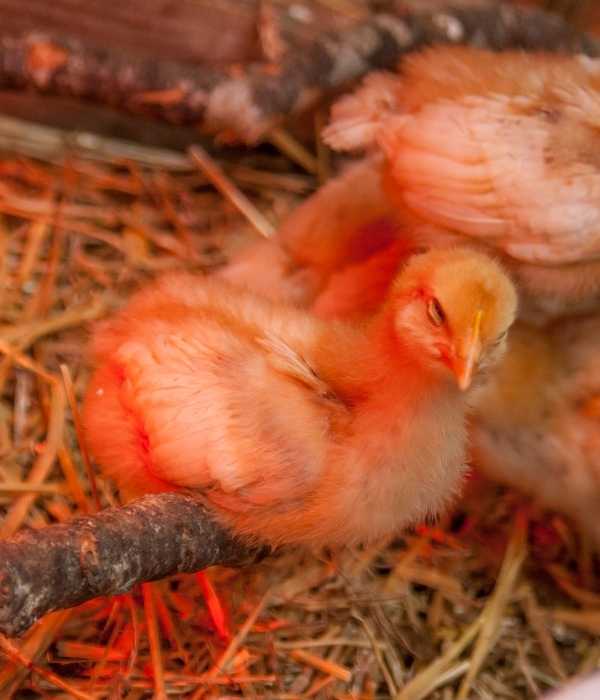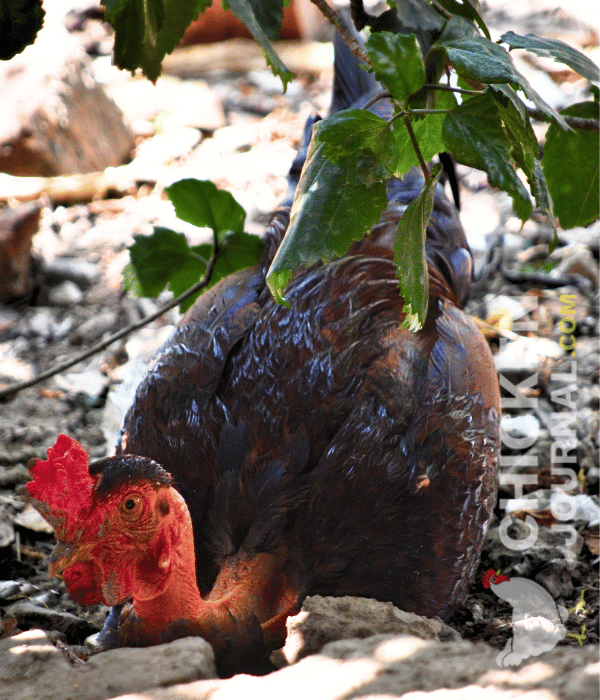How do chickens sleep? Most of the chicken raisers want to know it. If you are worried about your chicken’s sleeping pattern, you are at the right place.
Understanding the sleeping habits of chickens is essential for maintaining their health and well-being. Like other living beings, chickens also require sufficient rest to maintain their health and well-being.
In this guide, you will learn about chickens’ sleeping patterns, sleep duration, wake-up time, baby chicks’ sleeping patterns, social behaviors, and other FAQs.
How Do Chickens Sleep?
Sleep is an essential biological process that allows chickens and other animals to restore energy levels and consolidate memories.
Chickens may not have luxurious beds or pillows as humans do; nonetheless, they have distinct sleeping patterns that are ideally suited to their instincts.
The sleeping patterns of chickens are ideally suited to their instincts. On average, adult chickens need approximately 8 hours of sleep per day. However, this duration can vary depending on age and breed.
Baby chicks require more sleep than adults since growth and development consume much energy.
Unlike humans, who typically have one consolidated sleep period each night, chickens exhibit a unique pattern known as “split-sleep.”
This means chickens don’t sleep in one long run at night like humans do. Instead, they take short naps throughout the day and night. These short naps help them stay awake and aware of potential dangers even when resting.
The timing of a chicken’s sleep is influenced by its natural circadian rhythm. Chickens are diurnal creatures; hence, they are most active during daylight hours and seek shelter at dusk when predators become more active.
Consequently, chickens typically find a safe spot before darkness falls to roost comfortably for the night.
Sleep Patterns: Understanding How Chickens Sleep?

Like humans and other animals, chickens have their ways of sleeping. If you know how chickens sleep, you can learn a lot about their habits and health in general.
Even though chickens seem to have an easy sleep pattern, many things affect how they sleep.
Chickens don’t sleep like humans, who sleep for long at night. Instead, they sleep in short episodes. Chickens are called polyphasic sleepers because they take short naps throughout the day instead of sleeping for a long time at night.
On average, adult chickens need to sleep about 6 to 8 hours a day, but this can be different for the different chicken breeds, sizes, ages, and genes.
Most of the time, chickens roost at night when it is dark. Since they are awake during the day, they are busier and look for safe places to sleep at night.
When the sun goes down and it gets dark in the coop or henhouse, chickens will find a place to perch or roost to sleep.
Duration Of Sleep: How Long Do Chickens Sleep?
Chickens require enough sleep to stay healthy, just as people do. The sleeping patterns and duration of chickens differ significantly from those of humans.
Generally, an adult chicken needs 8 hours of sleep every day. This number varies by age, breed, and habitat. Younger chickens need more sleep than adults as they grow. Baby chicks can sleep 18-20 hours a day, too.
Chickens have “unihemispheric slow-wave sleep.” This implies just one part of their brain sleeps deeply while the other stays awake. This adaption lets them watch for dangers while resting.
Chickens lack eyelids like humans. Their eyes are covered by the thin nictitating membrane during rest. This membrane protects while permitting light vision. It keeps them alert to predators even when they’re sleeping.
The diurnal lifestyle keeps the chickens active throughout the day and resting at night. They usually wake up before sunrise when natural light brightens. Roosters naturally crow at sunrise to signal the start of a new day.
Wild free-range chicken flock clusters together for evening roosting, while domesticated hens may sleep differently depending on their house environment.
Other chicken breeds prefer private sleeping coops with perches or nests. Others may sleep in groups, primarily if raised together since hatching.
Chickens need a suitable sleeping area to rest. Perches or elevated areas help them sleep comfortably and securely. These constructions should be wide enough for chickens to balance and well-ventilated to prevent humidity and ammonia buildup.
Additionally, the coop or sleeping area must be clean and pest-free. To promote healthy chicken sleep, remove droppings, provide fresh bedding, and check for infestation.
Sleeping Time: Do Chickens Sleep During The Day Or Night?

Chickens’ sleeping patterns and duration differ significantly from humans and other animals. The average chicken needs 8 hours of sleeps every day. This time varies by age, breed, and the environment.
Younger chicks need more sleep than adults as they grow. Baby chicks can sleep 18-20 hours a day, too.
Chickens are daily, primarily active during the day and sleeping at night. They usually wake up before sunrise when the sunlight brightens. Roosters naturally crow at sunrise to signal the start of a new day.
All flocks gather near the coop in the evening and enter before darkness. Chicken breeds prefer sleeping alone in coops with perches or nesting boxes, and a few in groups. Their decisions and habits show chickens also like living in their comfort zone.
Wakeup Time: When Do Chickens Wake Up From Their Slumber?
The average chicken needs 8 hours of sleeps every day. So, if your adult chicken flock goes to night sleep at 7.00 p.m., then they will wake at around 4.00-5.00 a.m. But remember, if it is dark outside, they take 1-2 hours more naps.
Whereas baby chicks usually sleep for around 18-20 hours a day. They usually wake up before sunrise when the sunlight brightens.
Roosters naturally crow at sunrise to signal the start of a new day. Several chicken breeds prefer sleeping alone in coops with perches or nests. Others may sleep in groups, primarily if raised together since hatching.
Unusual Habits: Can Chickens Sleep With Their Eyes Open?

Chickens are fascinating animals known for their odd habits and strange ways of acting. One such behavior that frequently confuses others is the ability to sleep with eyes open.
You heard right! Chickens possess the remarkable ability to sleep with one eye open. Let’s examine this unusual behavior and the reasons for it.
Chickens often sleep with one eye open during short naps. This evolutionary advantage lets them stay alert when sleeping. Chickens need to remain alert to their surroundings since predators attack them.
They may relax while watching for dangers by keeping one eye open. This unique ability helps them survive outdoors by allowing them to react rapidly to threats.
Interestingly, baby chicks also show this tendency in their early life. After a few days of hatching, they start taking short naps with one eye open. This shows that sleeping with one eye open is natural, not something that needs to be taught to them.
Whereas chickens can sleep with one eye open, they can also close both eyes when sleeping. Sometimes, chickens also close both eyes during longer sleeps if there is no threat or they feel safe inside coops.
Hence, chickens can switch between sleeping with both eyes closed during deep sleep and one open during lighter sleep.
Chickens need a friendly sleeping environment to stay healthy. They need a secure coop and run area to feel safe while resting. This must include good ventilation, temperature regulation, and soft bedding like straw or wood shavings.
Chickens can sleep better by reducing external stressors like loud noises and sudden distractions. A peaceful chicken coop and run area will help them sleep better.
Baby Chicks Sleeping: Observing The Sleeping Patterns Of Young Birds

Baby chicks are adorable, but their sleeping habits differ significantly from mature chickens. Learning more about the sleeping habits of these young birds is essential for understanding their growth and development.
Although baby chicks seem always to sleep, their sleeping patterns depend on age and growth. Baby chicks sleep a lot in their first few days. They nap for 15-20 minutes throughout the day and night.
They recover and store energy with these short sleep episodes while they grow fast in this early stage.
The sleep schedules of young chickens change as they develop. They start sleeping regularly, roughly one week old. They start to develop a routine, with longer awake times throughout the day and longer sleep times at night.
Adult chickens like to sleep on perches or tree branches, but baby chicks usually sleep on the ground or in the nesting place that their mother hen makes for them. When sleeping, they gather in clusters for safety and comfort.
This resembles the natural defense technique of a baby chick gathering under its mother’s warm feathers.
Interesting, baby chicks can sleep with one eye open. This is a unique way for them to stay alert to possible dangers while getting some much-needed rest.
They can instantly recognize predator movement and threats with one eye closed and the other partially open.
Baby chicks need a comfy sleeping environment to grow and develop. Straw or wood shavings make a lovely nest for them to feel protected and secure. The bedding regulates temperature, keeping the little ones warm while sleeping.
Baby chicks sleep in groups in the early weeks but become more independent as they mature. As chicks mature, they sleep alone or with other adult hens in the coop or on perches.
Solitary sleeping indicates their growing independence and ability to protect themselves as adult birds. Baby chicks need a suitable sleeping environment for growth and environment.
Social Behavior: Do Chickens Prefer To Sleep Alone Or In Groups?
As social creatures, chickens naturally feel more secure when they can sleep in close range to other chickens. This natural ability is shown when hens gather on perches or tree branches at night.
Nighttime predators, including foxes, raccoons, and owls, have historically attacked chickens. Hens can take turns monitoring and alarming if attacked by sleeping in groups.
This communal awareness deters threats keeps some flocks alert and prepared to take action.
In cold seasons, chickens’ body temperatures can drop significantly at night due to their small size. Sleeping with other chickens gives warmth and insulation, keeping their body temperature suitable. This is vital for their health and saves energy on thermoregulation.
Chickens are sociable birds that form pecking orders among their groups. Sleeping together strengthens flock ties and reduces stress and anxiety. They groom each other, communicate through gentle clucking sounds, and feel safe in their fellows’ companionship.
Baby chicks acquire vital habits and routines from older flock members. By sleeping together, they learn about nighttime behaviors, roosting sites, and other chicken life skills.
Chickens usually like to sleep as a flock, but there are always exceptions to every rule. Due to their personality, some hens are more independent or less social, so they sleep, forage, and roost alone.
Creating A Comfortable Environment For Chicken Sleep

Chickens need a relaxed place to sleep for their mental and physical health. They need sleep to power up and live healthy, just like humans. Consider these elements for making your feathered companions’ sleeping environment comfy.
Safe space for sleeping
First and foremost, chickens need a secure sleeping environment. A strong coop or henhouse that protects from predators can do this.
Well-ventilated coops prevent drafts and promote fresh air flow. Enough insulation can also keep the coop calm so chickens can sleep comfortably.
Also read: Best fan for chicken coops
Roosting perches for sleeping and resting
Provide chickens with sufficient roosting places to make their sleep environment comfortable. Chickens prefer sleeping on perches because they feel safe from ground-based predators.
Roosting bars should be wide enough for birds’ feet to hold, which helps reduce sleep-related discomfort and injuries. Leaving ample space between roosting bars will reduce the chicken’s struggle for sleeping positions.
Suitable lighting for comfortable chicken sleeping
Lighting plays a crucial function in regulating chicken sleep cycles. Chickens are diurnal, which means they are most active during the day and tend to sleep at night.
They need enough darkness at night and light throughout the day to simulate natural light cycles. To achieve this, use curtains or blinds on windows, timers, or dimmers within the coop.
Also read: Best solar light for chicken coops
Reduce noise
Noise levels can also affect the quality of a chicken’s sleep. The loud sounds of close traffic or other animals can disturb their sleep.
Therefore, locating the coop in a quiet location away from excessive noise will help provide your flock with an ideal sleeping environment.
Good quality bedding for comfortable sleeping
Suitable coop and nesting box bedding are essential for chicken sleep. Straw, wood shavings, and sand make ideal chicken bedding.
Keep your chickens sleeping area clean by frequently cleaning and replacing the bedding materials. Dirty or wet bedding can cause respiratory problems and skin irritations in chickens, affecting the quality of their slumber.
Also read: Know about best nesting box pads
Temperature control in chicken coop
In addition to making adult chickens comfortable, baby chicks need a pleasant sleeping environment.
Young chicks need a safe, warm, brooding environment like their mother hen. Heat lamps or heating pads adjust temperature and provide nesting materials like shredded paper or pine shavings.
Also read: Complete guide on chicken brooding
Summary
Last but not least, hens are sociable birds during the day but alone at night. Given ample roosting space, each bird will have its spot without feeling crowded or uncomfortable.
Chickens need a friendly sleep environment for their health. You can give your chickens a peaceful night’s sleep by ensuring they have a safe place to roost, adequate lighting, little noise, high-quality bedding, and an allocated area for baby chicks of the flock.
In addition to making adult chickens comfortable, newborn chicks need an excellent sleeping environment. Young chicks need a safe, warm brooder like their mother hen.
Heat lamps or heating pads adjust temperature and provide nesting materials like shredded paper or pine shavings.
Finally, hens prefer to sleep alone at night but are gregarious during the day. Given ample roosting space, each bird will have its spot without feeling crowded or uncomfortable.
In conclusion, chickens need a pleasant sleep environment for their health. By evaluating safety, roosting alternatives, illumination, noise levels, bedding quality, and baby chick needs separately, you can give your flock a pleasant sleep environment that makes them happy.


